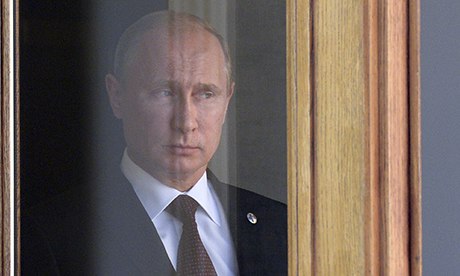
Geoffrey Wheatcroft
.
Before criticising Russia's president, the west should recognise its own history of betrayal towards his country
A very merry Christmas to Pussy Riot, Greenpeace and Mikhail Khodorkovsky, not to say to Vladimir Putin. At his somewhat bizarre annual press conference, with 1,300 journalist waving flags to capture his attention, Putin announced that Khodorkovsky, like the others, would be released from prison. Putin may not be a very lovable or gentle creature, but yet again he has shown himself to be unusually cunning, for all that he has been not only derided but consistently underrated.
Since the implosion of the Soviet Union, more than 20 years ago, the west has made every conceivable mistake in dealing with Russia. In what was meant to be the End of History, with the universal triumph of liberal democracy and market capitalism, American zealots attempted to impose free markets on Russia after more than 70 years of what had passed for socialism. The unhappy outcome should have been no surprise.
This is not a defence of Putin's in many ways unlovely regime. No journalist can feel much fondness for a country where troublesomeinvestigative reporters have a habit of turning up dead. But external policy is a quite different matter, even if the inability to distinguish between the internal character of the Russian regime and its foreign concerns is a very old story. Successive generations of starry-eyed people in the west were enchanted by the Soviet myth, and then disenchanted by what Malcolm Muggeridge sarcastically called "the left's stations of the cross": the Molotov-Ribbentrop pact in 1939; the Czech putsch in 1948; the suppression of Hungary in 1956.
Now it may be little consolation to Poles, Czechs and Hungarians, but on each occasion Russia was behaving like a great power. Beating up smaller neighbours is what great powers do: see the US record in Latin America. On Friday Putin said that Stalin was no worse than Oliver Cromwell, which may seem a little quaint, but it was Stalin who almost apologised for bullying demands on Finland with the words, "I am not responsible for geography."
Every attempt by Russia to safeguard its national interest has been seen as a provocation, when in truth the provocations have come from the west, for centuries past. When the Russians are called paranoid, I recall the writer Delmore Schwartz's wise saying that paranoiacs have enemies, too. A Russian army did not burn Paris in 1812, and Russia did not invade Germany in 1941.
Nor did Russia increase its alliances in the 90s; the west did, with an eastward expansion of Nato that was as stupid as it was disgraceful. It was a betrayal – George Bush the elder had given Mikhail Gorbachev a clear promise that the former eastern bloc countries, let alone the Baltic states newly independent of Russia, would not join Nato, on which Bill Clinton then reneged – and it was an insult.
"We have never thought of acknowledging the 'right' of Cuba or Haiti or the Republic of Panama – all of them independent sovereign states – to contract alliances which were inconsistent with the concert of the whole North American region." Thus said Walter Lippmann in 1944, and quite so. How would the Americans have reacted if Russia had invited Cuba to join the Warsaw Pact?
Even if Russian policy seems cynical and ruthless at times, it often turns out to be wiser than ours. In the 2008 crisis over South Ossetia, it was the Georgian government that picked the fight with Russia. The mind still reels at David Cameron's absurd arrival in Tblisi to demand the immediate admission of Georgia to Nato, which would have precipitated full-scale international war.
If that was what Cameron was like as opposition leader, what might he do as prime minister? Well, for the answer, look at Syria. Just as Gorbachev was stitched up over Nato, so was Putin over Libya, when he agreed to support a security council resolution ostensibly for "humanitarian" reasons, and then found it was a blatant intervention to destroy Gaddafi's regime, with predictably woeful consequences. Since then, Putin and his foreign minister, Sergei Lavrov, have refused to support the dazzling piece of statecraft by which our government has tried to topple Bashar al-Assad's regime, in order that Syria can be handed over to al-Qaida.
So, yuletide greetings to those newly freed in Moscow. And then perhaps a new year resolution, to leave Russia alone.



_jpg/250px-ElbeDay1945_(NARA_ww2-121).jpg)





